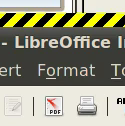 The recent release of Ubuntu 11.04, code named “Natty Narwhall”, includes a number of significant changes to one of the most popular open source linux distributions around. Though many of those who are discussing and reviewing the new operating system are focusing on the changes to the graphical user interface, and window manager, one of the changes that has me most excited is the switch from OpenOffice.org to LibreOffice.
The recent release of Ubuntu 11.04, code named “Natty Narwhall”, includes a number of significant changes to one of the most popular open source linux distributions around. Though many of those who are discussing and reviewing the new operating system are focusing on the changes to the graphical user interface, and window manager, one of the changes that has me most excited is the switch from OpenOffice.org to LibreOffice.
LibreOffice is a fork of the OpenOffice.org project, and is available for all major platforms including Mac OS X, Windows, and Linux. Like its predecessor, OpenOffice.org, LibreOffice is an open source office suite that emphasizes open document formats but is compatible with Microsoft Office. LibreOffice has received tremendous support from the community, and has seen widespread adoption by users of OpenOffice.org.
It originated in 2010 as a group of developers, under the name of the Document Foundation, who were not happy with Oracle’s stuardship of the OpenOffice.org project, forked the office suite and began development on LibreOffice in an effort to become independent of Oracle, and ensure that the project continues to be sustained as a community developed project. The Document Foundations hopes that one day Oracle will release the copyright to OpenOffice.org, and allow the Document Foundation to use the name. In the mean time a strong community of open source developers has put their efforts behind the LibreOffice project, and it has seen contributions from the like of Novell, Red Hat, and Canonical. LibreOffice has become a significant project, and in many ways has become the successor to OpenOffice.org.
In this episode I introduce you to LibreOffice, and show you how to install it on Ubuntu 10.04 LTS. The newest version of Ubuntu already comes with LibreOffice, but for those of you who are not using Ubuntu, or who prefer to use the more stable long term support version (LTS), I hope you find this tutorial useful.
If you have never heard of LibreOffice, or just want to take a peek at some of the differences between OpenOffice.org and LibreOffice, this episode will provide you with a high level overview of some of the features of LibreOffice. Before you know it, you will be recommending LibreOffice to your friends and coworkers as I have!
Show Notes: Oracle Buys Sun Oracle Kills OpenSolaris Installing from PPA
